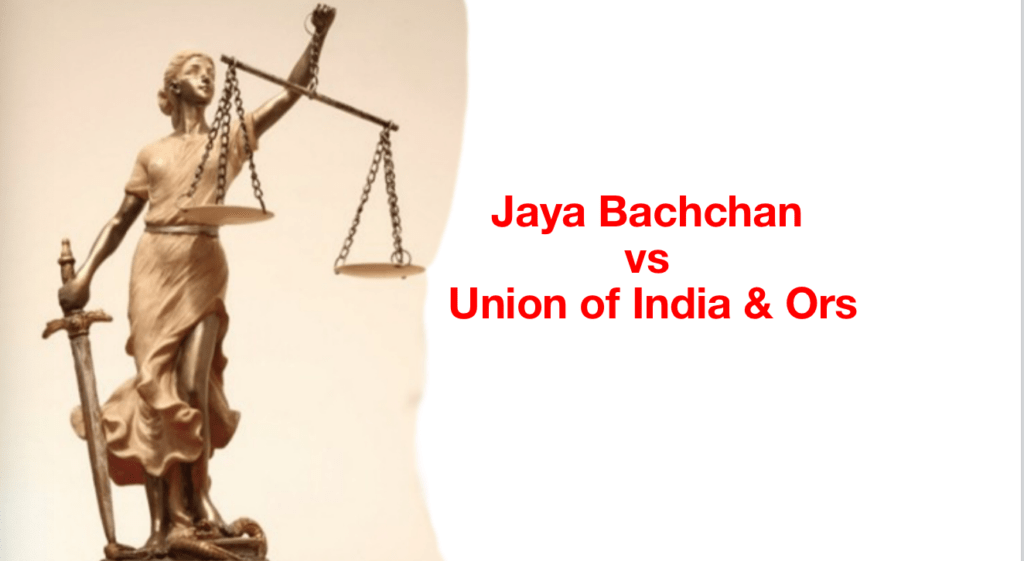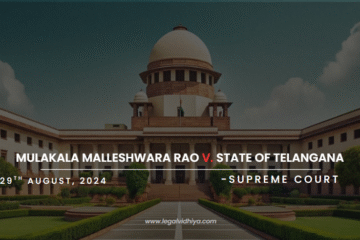
Introduction
This is the landmark case regarding the office of profit given under Article 102 of the Indian Constitution. It was decided by a three-judge bench of Y.K Sabharwal Cji, C.K. Thakker, and R.V. Raveendran on 8 May 2006. The petitioner, Jaya Bachchan filed a civil Writ Petition before the apex court against the defendants, Union of India & Ors. Challenging her disqualification as a member of the Rajya Sabha.
Facts
The government of Uttar Pradesh on 14 July 2004, appointed petitioner (Jaya Bachchan) as the chairperson of the Uttar Pradesh Film Development Council and sanctioned the rank of a Cabinet Minister to her. The benefits to which she is entitled are:
1) Honorarium of rupees 5000 per month.
2) Rupees 10000 per month towards entertainment expenditure.
3) Staff Car with driver, telephones at office and residence, one P.S. one P.A., and two class IV employees.
4) Bodyguard and Night escort
5) Free Accommodation and medical treatment facilities for her and her family members.
6) free accommodation in a government guest house and hospitality while on tour.
Petitioner became disqualified under Article 102(1)(a) of the Constitution for being a member of the Rajya Sabha on and from 14 July 2004 on her appointment by the government of U.P. as chairperson of the U.P. Film Development Council. Jaya Bachchan filed a writ petition under Article 32 of the Indian Constitution. The petition challenged the order of the Hon’ble President of India dated 16th March 2006. The President decided, that the petitioner is disqualified from being a member of the Rajya Sabha on and from 14 July 2004 on her appointment by the government of U.P. as chairperson of the U.P. Film Development Council as per the provisions of Article 102(1)(a)
The petitioner also challenged the opinion of the Election Commission dated 2 March 2006. The Election Commission also found and expressed the opinion that the office of the chairperson of the Council to which the petitioner was appointed by the state government is an “office of profit” for the purposes of Article 102(1)(a) of the Constitution.
Petitioner’s Contention
The petitioner, Jaya Bachchan contented that she never used any of the facilities provided by the state government and she accepted the chairpersonship of the council honorarily and did not use any of the facilities mentioned. Another argument which is made by the petitioner is that in the finding by the Election Commission that she had not received any payment or monetary consideration from the state govt, she could not be said to hold any office of profit under the state government and therefore, her disqualification was invalid.
Issues
- What is office of profit under Article 102(1)(a) of the Constitution.
- Whether the disqualification is valid.
Legal question
- Article 102 (1)(a) of the Constitution.
A person shall be disqualified for being chosen as, and for being, a member of either House of Parliament—
(a) if he holds any office of profit under the Government of India or the Government of any State, other than an office declared by Parliament by law not to disqualify its holder;
(b) if he is of unsound mind and stands so declared by a competent court;
(c) if he is an undischarged insolvent;
(d) if he is not a citizen of India, or has voluntarily acquired the citizenship of a foreign State, or is under any acknowledgment of allegiance or adherence to a foreign State;
(e) if he is so disqualified by or under any law made by Parliament.
The petitioner is disqualified as per the first situation given above as she was holding office under the U.P. government.
- Article 103 of the constitution
The article talks about the obligation of the President to seek an opinion from the election commission as to regards the disqualification of any of the members of either of the house. Also, if any dispute arises with respect to disqualification the decision of the president shall be final.
3) Section 3 of the Parliament (Prevention of Disqualification) Act,1959
4) Article 32 of the Constitution.
Under Article 32 a writ petition can be filed before the Supreme Court.
Conclusion
The apex court found no merit in the writ petition, which is dismissed. While addressing the issue the question before the apex court is whether a person who holds an office of profit is required to be interpreted in a realistic manner. The apex court stated that an office of profit is an office that can yield a profit or pecuniary gain. if the office carries with it or entitles the holder to, any pecuniary gain other than actual expenses, then the office will be an office of profit for the purpose of Article 102(1)(a).
Further, the court elaborated that if the office can yield a profit, then it will be regarded as the office of profit and not whether the person actually obtained a monetary gain. The Pecuniary gains like monthly honorarium of Rs. 5000, entertainment expenditure of Rs. 1000, staff car with driver, telephones at office and residence, etc are carried with office and these are profits which cannot be denied. The fact that the petitioner is affluent or was not interested in the benefits of the state govt is not relevant to the issue and her contention that she never used any of the facilities provided by the state government is not valid as getting any profit or using them is another thing but when the office is capable of yielding profits then that will amount to the office of profit.
Written by Geasu Sharma of Amity University, Noida of 4th Semester.




0 Comments